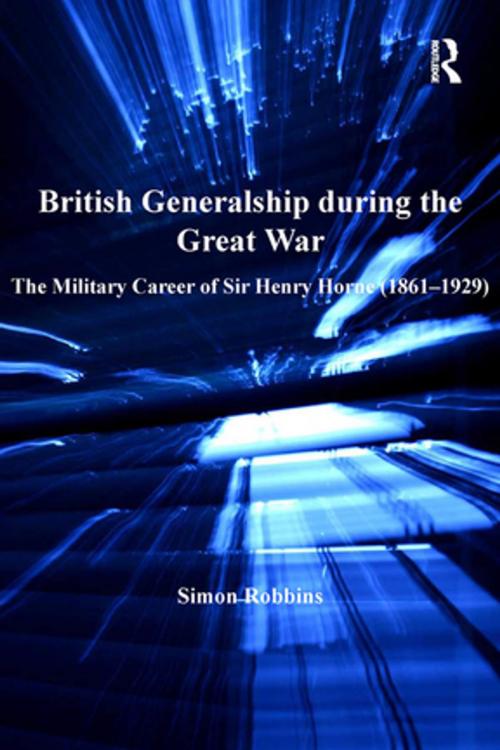British Generalship during the Great War
The Military Career of Sir Henry Horne (1861–1929)
Nonfiction, History, Military, World War I| Author: | Simon Robbins | ISBN: | 9781317171966 |
| Publisher: | Taylor and Francis | Publication: | April 15, 2016 |
| Imprint: | Routledge | Language: | English |
| Author: | Simon Robbins |
| ISBN: | 9781317171966 |
| Publisher: | Taylor and Francis |
| Publication: | April 15, 2016 |
| Imprint: | Routledge |
| Language: | English |
Following the career of one relatively unknown First World War general, Lord Horne, this book adds to the growing literature that challenges long-held assumptions that the First World War was a senseless bloodbath conducted by unimaginative and incompetent generals. Instead it demonstrates that men like Horne developed new tactics and techniques to deal with the novel problems of trench warfare and in so doing seeks to re-establish the image of the British generals and explain the reasons for the failures of 1915-16 and the successes of 1917-18 and how this remarkable change in performance was achieved by a much maligned group of senior officers. Horne's important career and remarkable character sheds light not only on the major battles in which he was involved; the progress of the war; his relationships with his staff and other senior officers; the novel problems of trench warfare; the assimilation of new weapons, tactics and training methods; and the difficulties posed by the German defences, but also on the attitudes and professionalism of a senior British commander serving on the Western Front. Horne's career thus provides a vehicle for studying the performance of the British Army in the first quarter of the Twentieth Century. It also gives an important insight into the attitudes, ethos and professionalism of the officer corps which led that army to victory on the Western Front, exposing not only its flaws but also its many strengths. This study consequently provides a judgment not only on Horne as a personality, innovator and general of great importance but also on his contemporaries who served with the British Armies in South Africa and France during an era which saw a revolution in military affairs giving birth to a Modern Style of Warfare which still prevails to this day.
Following the career of one relatively unknown First World War general, Lord Horne, this book adds to the growing literature that challenges long-held assumptions that the First World War was a senseless bloodbath conducted by unimaginative and incompetent generals. Instead it demonstrates that men like Horne developed new tactics and techniques to deal with the novel problems of trench warfare and in so doing seeks to re-establish the image of the British generals and explain the reasons for the failures of 1915-16 and the successes of 1917-18 and how this remarkable change in performance was achieved by a much maligned group of senior officers. Horne's important career and remarkable character sheds light not only on the major battles in which he was involved; the progress of the war; his relationships with his staff and other senior officers; the novel problems of trench warfare; the assimilation of new weapons, tactics and training methods; and the difficulties posed by the German defences, but also on the attitudes and professionalism of a senior British commander serving on the Western Front. Horne's career thus provides a vehicle for studying the performance of the British Army in the first quarter of the Twentieth Century. It also gives an important insight into the attitudes, ethos and professionalism of the officer corps which led that army to victory on the Western Front, exposing not only its flaws but also its many strengths. This study consequently provides a judgment not only on Horne as a personality, innovator and general of great importance but also on his contemporaries who served with the British Armies in South Africa and France during an era which saw a revolution in military affairs giving birth to a Modern Style of Warfare which still prevails to this day.















